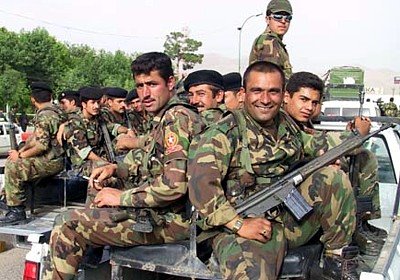Analysis: As Kurd and Arab clashes surge, a third war is looming in Iraq
 Kurdish militia fighters are believed to have heavily infiltrated the Iraqi Army in the north.
Kurdish militia fighters are believed to have heavily infiltrated the Iraqi Army in the north.When the Kurdish President, Massoud Barzani, banned the Iraqi flag from being flown on top of public buildings in Kurdistan this month, the Iraqi Kurds took a further symbolic step towards de facto independence. He justified the ban by saying "so many pogroms and mass-killings were committed in its name".
The Iraqi Kurds are not seeking statehood, calculating that this is not now in their interests, but they want a degree of autonomy that amounts almost to the same thing. "If there is no federal solution there is no hope for this country," Mr Barzani told The Independent in his mountain-top headquarters in Salahudin overlooking the Kurdish capital, Arbil.
Mr Barzani's refusal to allow the Iraqi flag to be hoisted was sharply criticised by politicians in Baghdad. The Prime Minister, Nouri al-Maliki, produced a bizarre endorsement of his national emblem saying: "Not only the Kurds were slaughtered under this flag, but many Iraqis were slain under this flag. Iraq was slain under this flag."
But to many Arab Iraqis the flag means a lot. In Mosul, where Arabs and Kurds are in conflict, the mainly Arab police force went around insisting that shopkeepers and public buildings fly the Iraqi flag. A month later, street-sellers were doing a steady business selling miniature Iraqi flags to drivers.
The Kurdistan over which Mr Barzani rules is the only peaceful part of Iraq and has been so since the fall of Saddam Hussein in 2003. Made up of the three Kurdish provinces of Arbil, Dohuk and Sulaimaniyah, the enclave escaped rule from Baghdad in 1991 after the Kurdish uprising and was protected by US over-flights.
Arab Iraqis got used to the idea that this wholly Kurdish enclave known as the Kurdistan Regional Government (KRG) enjoys semi-independence. But it is the Kurdish determination to allow Kurdish majority areas in the rest of northern Iraq, notably Kirkuk, to join the KRG that is leading to a deepening conflict between Arabs and Kurds on the ground.
Iraq is already the site of two wars, one between the Iraqi Sunni community and the US that started in 2003 and a second sectarian conflict between Sunni and Shia Arabs that began in 2005. Iraq may now be beginning to suffer a third war, between Arabs and Kurds in the northern provinces.
This is because under Article 140 of the Iraqi constitution, agreed last year, the Kurds won the right to return to areas from which they have been driven for more than half a century. A census will then determine who lives where and, finally, a referendum must be held by the end of 2007, under which Kurdish areas can join the KRG.
The plan is having explosive consequences. Kurds claim to make up as much as a third of the 2.7 million population of Mosul province next door. They have an enclave at Khanaqin in Diyala province north-east of Baghdad. In many cases, the Kurdish and Arab populations are intertwined and animosity is increasing.
In Mosul city, some four or five Kurds are killed every day, the deputy governor, Khasro Goran, said. Seventy thousand Kurds have been forced to flee this year, mostly from Mosul city, he added. In Kirkuk, there is a surge in the bombings of Kurdish party headquarters and assassinations of Kurds. In Diyala, Baghdad and across central Iraq, Kurds are taking flight for the safety of the KRG.
Co-operation at ground level between Arab and Kurd is becoming more difficult. In Jalawla, a mixed town in Diyala province, Arab and Kurdish members of the local police fought a gun-battle last weekend. This was because an Arab police major had replaced a Kurdish one and the new police chief wanted to replace Kurdish rank-and-file with Arabs.
Read the rest at the Kurdish Aspect
Related Link:
Analysis: Kurdish movement could spread war regionally
Related Link:
Kurd leader again threatens secession, this time over oil
Related Link:
Analysis: Kurds and Arabs vie for control of Mosul

<< Home